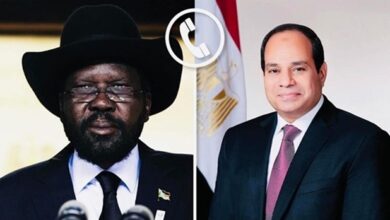Amid heavy speculation that the South Sudan referendum, which concluded on Saturday, will split the country into two separate states, experts predict that Egypt will suffer greatly from the effects of separation.
The main concerns revolve around the possibility that Egypt’s share of the Nile waters would decrease, violence and chaos would push Sudanese refugees into Egypt, and the implementation of Sharia Law in North Sudan could promote terrorism and strengthen Egypt’s internal Islamist movements.
Hamid Ali, public policy professor at the American University in Cairo, said that even though the results of the referendum will not be revealed before next month, it is almost certain that the country will be divided.
Nabil Abdel Fatah, a political expert at the Cairo-based Al-Ahram Center for Political and Strategic Studies, said that the secession will have “extremely dangerous implications” for Egypt’s national security. Ali concurred that in the case of escalating civil war, Egypt stands to lose.
Violence, which is expected to increase in Sudan after the secession, could lead to the influx of an estimated 3 million Sudanese refugees into Egypt as armed conflicts break out between north and south over unresolved issues such as oil, nationality and the division of national debt, according to Abdel Fatah.
He mentioned other disputes–such as northern opposition to the north's ruling party and armed conflict in Darfur–as additional reasons that Egypt can expect a rush of Sudanese refugees.
“Any armed dispute leading to an influx of Sudanese refugees into Egypt would constitute a social burden slowing down Egypt’s development and threatening its internal security,” said Abdel Fatah.
The split could also lead to the rise of terrorism and radical Islam in the region. Separation from the mostly Christian South could prod Khartoum’s self-declared Islamist government to intensify calls for implementing Islamic Sharia Law in the north.
“If south Sudan secedes, we will change the constitution and at that time there will be no time to speak of diversity of culture and ethnicity,” Reuters cited the Sudanese President Omar Hassan al-Bashir as recently telling supporters at a rally in the eastern city of Gedaref.
“Sharia and Islam will be the main source for the constitution, Islam the official religion and Arabic the official language,” he said.
The likelihood that North Sudan’s ruling party will exploit Islam to maintain its legitimacy following South Sudan’s secession could transform the growing number of Sudan’s Salafis into a more militant group and lead to the creation of an Al-Qaeda base of operations in North Sudan. Abdel Fattah labels this scenario as “extremely dangerous” and says that the growth of Al-Qaeda and Jihadi movements in the neighboring country not only creates a terrorist threat to Egypt but may also strengthen Islamist movements inside Egypt.
The fear that North Sudan would serve as a base for radical Islam has historical roots. In the 1990s, Sudan was as a base for such groups under the Bashir-Turabi alliance and hosted Osama Bin Laden. It also hosted many Egyptian Islamist groups, some of whom claimed responsibility for an assassination attempt against Mubarak in Ethiopia in 1995.
Another threat to Egypt’s security rests with the Nile, which constitutes 79.3 percent of Egypt’s water resources. Treaties controlling the distribution of water among the ten Nile basin countries currently allocate 55.5 billion cubic meters to Egypt and 18.5 billion cubic meters to Sudan.
Ali says that the addition of another country to the Nile basin will decrease Egypt’s portion, especially since South Sudan will need to develop its own agriculture, urban growth and development.
Ali fears the economic effects of the secession as well. He says that an east Sudan faction that declared rebellion against the central government a few days ago could prompt conflicts that destroy the north’s already weakened economy, which would affect Egypt’s economy also.
Samer Soliman, political science professor at the American University in Cairo, states that the south’s separation will have social implications for Egypt. He says that some people regard the split as constituting a conspiracy against Islamic and Arab nations, while others argue it proves the failure of political Islam.
"The Sudanese drama is going to empower the case for secularism and democracy in Egypt on the one hand, but it may also increase the anger and the violence against minorities and secular people who could be accused of conspiring against the unity of the Islamic or Arab nation,” says Soliman.
Abdel Fatah denies concerns exist regarding Egypt’s relations with both countries. Relations with South Sudan, however, could deteriorate in time, especially since it is expected to be supported by Israel.
“I think the Egyptian government has made some good gestures to South Sudan; they need to put pressure on the National Congress Party to resolve the country’s problems once and for all,” says Ali.
The Egyptian government has been too preoccupied with internal problems to adequately prepare itself for the ramifications of South Sudan’s secession, said Abdel Fattah. “Egypt doesn’t have a political vision to deal with threats to its national security.”




